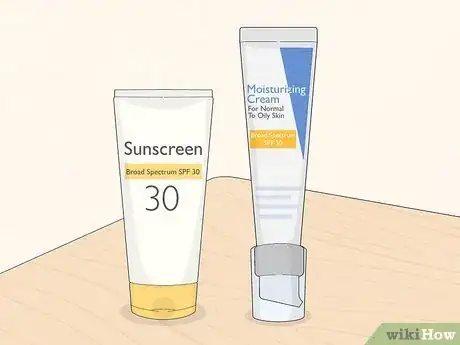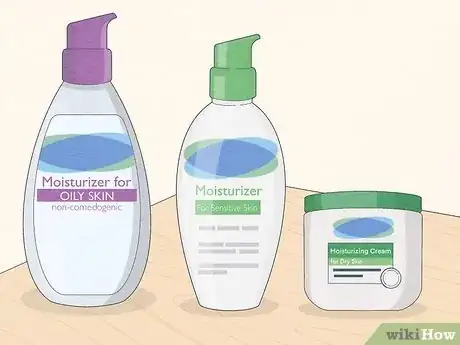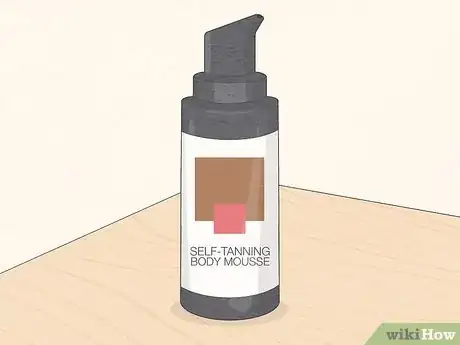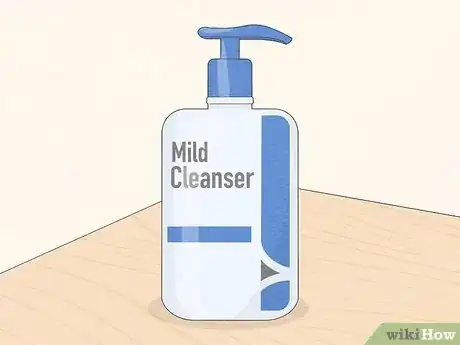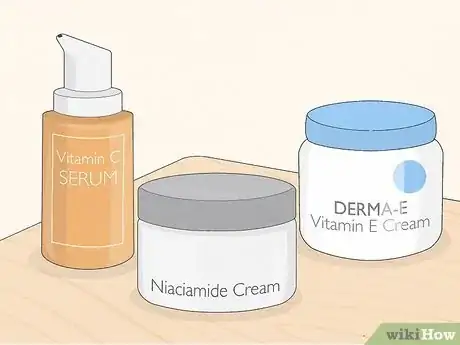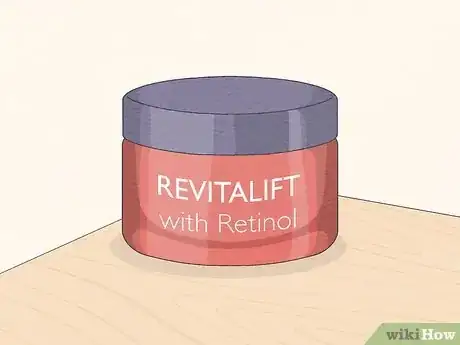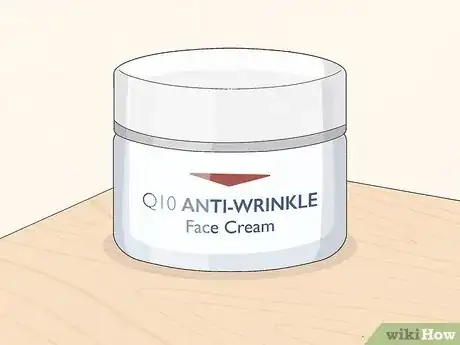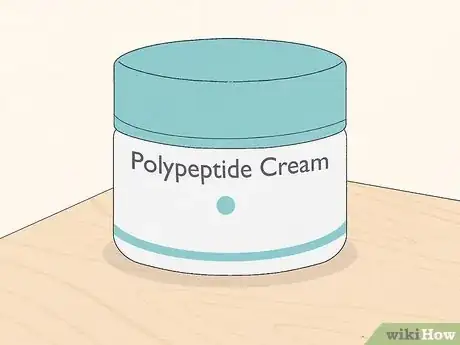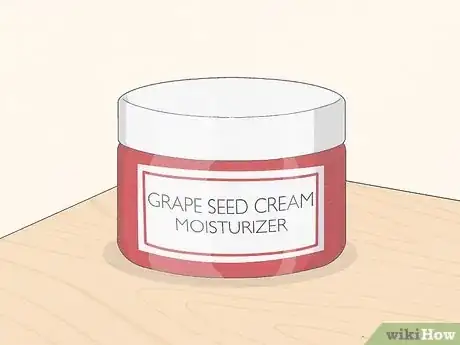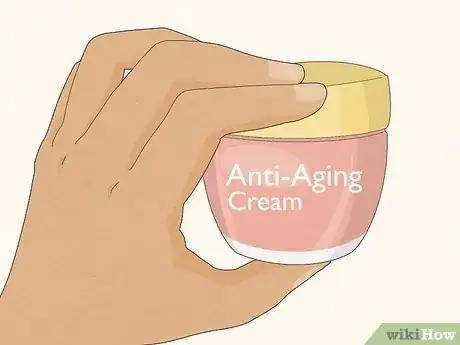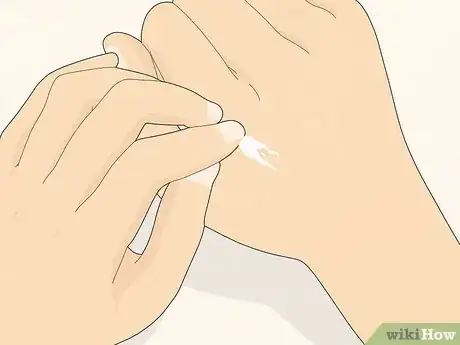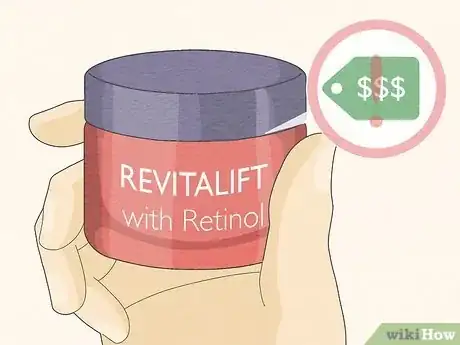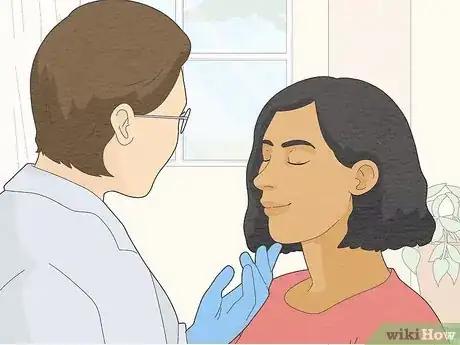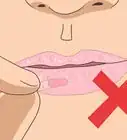This article was co-authored by Heather Richmond, MD. Dr. Heather Richmond, MD is a board certified Dermatologist at Dermatology and Laser Surgery Center in Houston, Texas. With over nine years of experience, Dr. Richmond specializes in comprehensive dermatology including medical, surgical, and cosmetic procedures. She graduated cum laude from Yale University with a BA in Molecular, Cellular, and Developmental Biology. She earned her MD from the University of California, Irvine School of Medicine, where she was inducted into the Alpha Omega Alpha Honor Medical Society. She completed her Internal Medicine internship at Cedars-Sinai Medical Center and her Dermatology residency at The University of Texas MD Anderson Cancer Center in Houston. Dr. Richmond is a fellow of the American Academy of Dermatology and is a member of the American Society for Dermatologic Surgery, American Society for Laser Medicine and Surgery, and the Texas and Houston Dermatological Societies.
There are 12 references cited in this article, which can be found at the bottom of the page.
This article has been viewed 41,071 times.
Anti-aging is a trending topic these days. Of course, you want to get the latest and best anti-aging cream; however, you should start by picking some basic products to add to your everyday skincare regimen. Once you do that, you can pick an anti-aging product with ingredients that may help reduce your chance of aging. Consider checking with a dermatologist before you begin a new skin care regimen, especially if you are known to have sensitive skin.
Steps
Picking Basic Products
-
1
-
2Pick a moisturizer that's right for you skin. Moisturizing your skin every day can make a large difference in how your skin ages;[5] however, it's important to pick one that's right for your skin.[6]
- For oily skin, pick something light that's water-based. You should look for one that's noncomedogenic (it will say it on the bottle) to help keep your pores from clogging. For dry skin, you need something with more weight. An oil-based moisturizer is preferable.[7] If you're somewhere in the middle, you should probably stick with a something lighter that's water-based. Most moisturizers are labelled for skin type. As you get older, though, your skin will need more moisture, so pick an oil-based moisturizer no matter what your skin type as you age.[8]
- If your skin is sensitive, pick a moisturizer that will soothe rather than irritate. Ingredients that may irritate include scents, dyes, and acids. Ingredients that will soothe include aloe and chamomile.[9]
- To cut down on your routine, consider buying a moisturizer with a built-in sunscreen, so you don't need to apply two products.
-
3Choose a sunless tanner. While a sunless tanner isn't anti-aging on its own, tanning in the sun or at tanning beds can age your skin faster; therefore, using a tanning cream instead can be safer for your skin.
- If you're new to sunless tanners, pick a lotion or gel, which are easier to apply than mousses. Also, stick with a lighter color, as you can always apply more if you need to do so, but you can't take it off as easily if your skin becomes too dark.[10]
- Also, apply a tiny bit in a small area before applying it to your whole body. That way, you can see what the color looks like on you.[11]
- Skip applying sunless tanners around your mouth, nose, and eyes. While sunless tanners are generally more safe than tanning in the sun, the FDA hasn't approved their use near these areas.[12]
-
4Add a mild cleanser. Washing the day off your face at the end of the day is important in keeping your skin healthy and young. Cleansers are often better than soaps.[13] They are better targeted to deal with various skin problems.
- When choosing a cleanser, look for one that's meant for your skin type. They should be labelled to help you choose.[14]
- If you have a specific problem, like acne, pick a cleanser that helps deal with that issue. Once again, the bottles should be labelled for skin problems, too.
Finding Anti-Aging Creams With the Right Ingredients
-
1Look for the antioxidants. Creams with antioxidants can be beneficial. They help absorb free radicals that can cause damage to your skin.[15] Antioxidants to look for include vitamin C, vitamin B3, and vitamin E. These vitamins are particularly effective in a cream because they are able to be absorbed into the skin more readily than others.[16]
-
2Choose one with vitamin A. Though vitamin A is also an antioxidant, it does more than just work on free radicals. It can also help increase production of collagen fibers in your skin. Collagen fibers affect elasticity, meaning it can cut down on wrinkles.[19]
- Retinol is a form of vitamin A, so look for that on the label.[20]
-
3Pick one with coenzyme Q10. This ingredient can also help reduce wrinkles. In addition, it may help protect your skin against the sun.[21]
-
4Check for polypeptides or oligopeptides. These ingredients mimic peptides in your skin. Specifically, they can mimic collagen or elastin, the fibers the help regulate elasticity. They encourage your skin to produce more of these molecules, which in turn helps reduce wrinkles on your skin.[22]
-
5Read for extracts. Certain extracts also act as antioxidants. In addition, many of them are also anti-inflammatory, helping your skin be less puffy. Two to look for are green tea extract and grape seed extract. Grape seed extract also helps you heal from skin injuries.[23]
Picking the Right One for You
-
1Pick a single product. Using multiple anti-aging products, such as wrinkle creams, can actually work against you. Multiple products can irritate your skin, which does not help you with aging. Stick to one main product directly aimed at anti-aging.
-
2Patch test new products. Before you slather a cream all over your face, it's best to test it on your skin. Put a small amount on the side of your neck. Leave it on for 24 hours, checking to see if you have a reaction to the cream, such as a rash. If you do, you don't want to use it on your face.[24]
-
3Don't be fooled by price. Just because a product is more expensive, that does not mean it's more effective. Some less-expensive products can have the same or similar ingredients.
-
4
Expert Q&A
-
QuestionHow much should I spend on anti-aging products?
 Heather Richmond, MDDr. Heather Richmond, MD is a board certified Dermatologist at Dermatology and Laser Surgery Center in Houston, Texas. With over nine years of experience, Dr. Richmond specializes in comprehensive dermatology including medical, surgical, and cosmetic procedures. She graduated cum laude from Yale University with a BA in Molecular, Cellular, and Developmental Biology. She earned her MD from the University of California, Irvine School of Medicine, where she was inducted into the Alpha Omega Alpha Honor Medical Society. She completed her Internal Medicine internship at Cedars-Sinai Medical Center and her Dermatology residency at The University of Texas MD Anderson Cancer Center in Houston. Dr. Richmond is a fellow of the American Academy of Dermatology and is a member of the American Society for Dermatologic Surgery, American Society for Laser Medicine and Surgery, and the Texas and Houston Dermatological Societies.
Heather Richmond, MDDr. Heather Richmond, MD is a board certified Dermatologist at Dermatology and Laser Surgery Center in Houston, Texas. With over nine years of experience, Dr. Richmond specializes in comprehensive dermatology including medical, surgical, and cosmetic procedures. She graduated cum laude from Yale University with a BA in Molecular, Cellular, and Developmental Biology. She earned her MD from the University of California, Irvine School of Medicine, where she was inducted into the Alpha Omega Alpha Honor Medical Society. She completed her Internal Medicine internship at Cedars-Sinai Medical Center and her Dermatology residency at The University of Texas MD Anderson Cancer Center in Houston. Dr. Richmond is a fellow of the American Academy of Dermatology and is a member of the American Society for Dermatologic Surgery, American Society for Laser Medicine and Surgery, and the Texas and Houston Dermatological Societies.
Board Certified Dermatologist That all depends on the type of product. In general, I would avoid very low-priced products which may be unreliable. I suggest you look for a reputable brand that's recommended by a medical professional.
That all depends on the type of product. In general, I would avoid very low-priced products which may be unreliable. I suggest you look for a reputable brand that's recommended by a medical professional. -
QuestionWhat is the best drugstore brand of anti-aging moisturizers?
 Chris M. Matsko, MDDr. Chris M. Matsko is a retired physician based in Pittsburgh, Pennsylvania. With over 25 years of medical research experience, Dr. Matsko was awarded the Pittsburgh Cornell University Leadership Award for Excellence. He holds a BS in Nutritional Science from Cornell University and an MD from the Temple University School of Medicine in 2007. Dr. Matsko earned a Research Writing Certification from the American Medical Writers Association (AMWA) in 2016 and a Medical Writing & Editing Certification from the University of Chicago in 2017.
Chris M. Matsko, MDDr. Chris M. Matsko is a retired physician based in Pittsburgh, Pennsylvania. With over 25 years of medical research experience, Dr. Matsko was awarded the Pittsburgh Cornell University Leadership Award for Excellence. He holds a BS in Nutritional Science from Cornell University and an MD from the Temple University School of Medicine in 2007. Dr. Matsko earned a Research Writing Certification from the American Medical Writers Association (AMWA) in 2016 and a Medical Writing & Editing Certification from the University of Chicago in 2017.
Family Medicine Physician Any brand is fine, just make sure that it has sunscreen with broad spectrum UVA and UVB coverage.
Any brand is fine, just make sure that it has sunscreen with broad spectrum UVA and UVB coverage.
References
- ↑ Heather Richmond, MD. Board Certified Dermatologist. Expert Interview. 15 September 2020.
- ↑ https://www.nlm.nih.gov/medlineplus/skinaging.html
- ↑ http://www.mayoclinic.org/healthy-lifestyle/adult-health/in-depth/best-sunscreen/art-20045110
- ↑ https://www.aad.org/public/skin-hair-nails/younger-skin/selecting-anti-aging-products
- ↑ https://www.aad.org/public/skin-hair-nails/younger-skin/selecting-anti-aging-products
- ↑ http://www.mayoclinic.org/diseases-conditions/dry-skin/in-depth/moisturizers/art-20044232
- ↑ Heather Richmond, MD. Board Certified Dermatologist. Expert Interview. 15 September 2020.
- ↑ http://www.mayoclinic.org/diseases-conditions/dry-skin/in-depth/moisturizers/art-20044232
- ↑ http://www.mayoclinic.org/diseases-conditions/dry-skin/in-depth/moisturizers/art-20044232
- ↑ https://www.birchbox.com/magazine/article/self-tanners-a-cheat-sheet
- ↑ https://www.birchbox.com/magazine/article/self-tanners-a-cheat-sheet
- ↑ http://www.mayoclinic.org/healthy-lifestyle/adult-health/in-depth/sunless-tanning/art-20046803?pg=2
- ↑ https://www.aad.org/public/skin-hair-nails/younger-skin/creating-anti-aging-plan
- ↑ Heather Richmond, MD. Board Certified Dermatologist. Expert Interview. 15 September 2020.
- ↑ http://www.mayoclinic.org/diseases-conditions/wrinkles/in-depth/wrinkle-creams/art-20047463
- ↑ http://www.ncbi.nlm.nih.gov/pmc/articles/PMC3583892/
- ↑ http://www.mayoclinic.org/diseases-conditions/wrinkles/in-depth/wrinkle-creams/art-20047463
- ↑ http://www.mayoclinic.org/diseases-conditions/wrinkles/in-depth/wrinkle-creams/art-20047463
- ↑ http://www.ncbi.nlm.nih.gov/pmc/articles/PMC3583892/
- ↑ http://www.mayoclinic.org/diseases-conditions/wrinkles/in-depth/wrinkle-creams/art-20047463
- ↑ http://www.mayoclinic.org/diseases-conditions/wrinkles/in-depth/wrinkle-creams/art-20047463
- ↑ http://www.ncbi.nlm.nih.gov/pmc/articles/PMC3583892/
- ↑ http://www.mayoclinic.org/diseases-conditions/wrinkles/in-depth/wrinkle-creams/art-20047463
- ↑ http://blog.reneerouleau.com/how-to-avoid-a-negative-reaction-to-new-skin-care-products/
- ↑ Heather Richmond, MD. Board Certified Dermatologist. Expert Interview. 15 September 2020.
- ↑ http://blog.reneerouleau.com/how-to-avoid-a-negative-reaction-to-new-skin-care-products/
About this article
One of the most important anti-aging products you can buy is sunscreen. The sun is a major cause of premature aging, so it's important to wear a broad-spectrum sunscreen with at least SPF 15 whenever you go outside. Another must-have product is a good moisturizer. Apply moisturizer every single day. Oil-based moisturizers are the most effective, but you may want to use a water-based moisturizer if you have oily or acne-prone skin. When it comes to products specifically designed for anti-aging, some ingredients you should look for include vitamin C, vitamin B3, vitamin E, vitamin A, coenzyme Q10, polypeptides, and oligopeptides. For more expert skincare advice, check out the full article below!
